Introduction
Salesforce Data Cloud helps organizations unify customer data from various sources, analyze it to gain valuable insights, and personalize experience across channels. It helps maximize ROI and boost operational efficiency.
The recent announcement in Dreamforce 2023 has also clarified that Data Cloud is the future foundation for data in Salesforce. It will power everything from the system of record for customer data to enable customer engagement within different industry clouds.
Data Cloud makes bringing whatever data you want into Salesforce easy. By unifying and harmonizing that data, it creates a golden record that contains all the information about your customers, your orders, cases, vehicles, or whatever entity you choose.
Steve Fisher, EVP & GM of Next Gen CRM & Unified Data Services @Salesforce
What Is Salesforce Data Cloud?
Salesforce Data Cloud is a comprehensive platform that helps organizations manage customer data at scale. It ingests data from multiple sources, matches customer records, maintains accuracy, and makes unified customer profiles for analytical, marketing, service, and sales use.
Data Cloud also enables real-time segmentation and activation to optimize customer engagement. Some of its key capabilities are:
- Connects data from CRMs, web apps, mobile applications, loyalty programs, and email platforms
- Resolves customer profiles across data sources through probability matching
- Maintains accurate customer profiles with consistent data quality checks
- Builds unified customer profiles with analytical attributes
- Segments customers and activates marketing campaigns based on user behavior
- Generates actionable insights from customer data by leveraging AI
Data Cloud is built using Salesforce metadata, ensuring that the data stored in the Cloud is visible and available in Customer 360. Data also goes through several stages while being processed within the Data Cloud.
A Short Tale: How Williams-Sonoma, Inc. Nurtures Customer Relationships With Salesforce Data Cloud
Williams-Sonoma, Inc. has nine brands that are household names, including Pottery Barn, Pottery Barn Kids, PBteen, West Elm, and Williams Sonoma Home. Each of these brands serves a different audience that requires more than a tailored message to build lasting customer relationships.
By leveraging Salesforce Data Cloud, Marketing Cloud, and Experience Cloud, the organization has been able to:
- Deliver personalized messages that customers look forward to
- Launched several targeted marketing campaigns
- Provide faster support with efficient sales and service
- Utilize AI to automate tasks and centralize work
This has led to a growth of 21 million subscribers, maximizing employee performance, maintaining stability, and accelerating time to value.
Benefits Of Salesforce Data Cloud
Salesforce Data Cloud helps organizations boost ROI, operational efficiency, and achieve other benefits like:
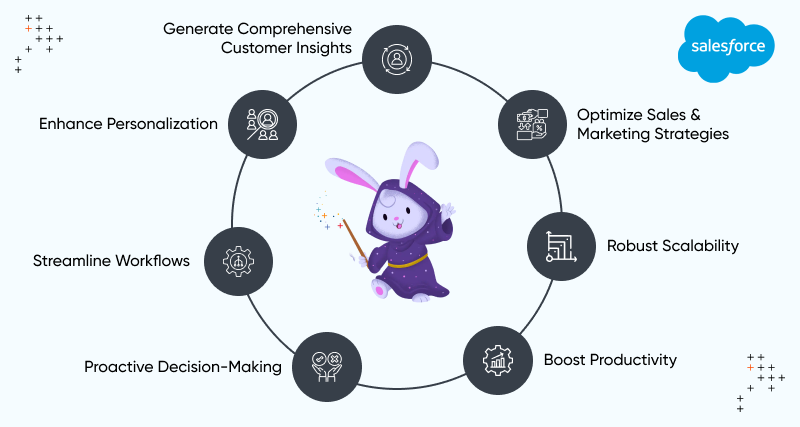
Generate Comprehensive Customer Insights
Data Cloud can construct a cohesive 360-degree customer data perspective from diverse origins. The simplified access and centralization of customer information empower organizations to base decisions on data, implement personalization strategies, and enhance sales and marketing initiatives, ultimately leading to a higher ROI.
Enhance Personalization
Data Cloud uses enriched customer profiles and behavioral data to facilitate precise audience segmentation. This helps run targeted marketing campaigns, personalized recommendations, and customized messaging, leading to heightened customer engagement, increased conversion rates, and higher ROI.
Optimize Sales & Marketing Strategies
Salesforce Data Cloud helps organizations get detailed insights into their sales and marketing initiatives. By scrutinizing customer behavior, evaluating campaign effectiveness, and identifying high-value leads, businesses can optimize resource allocation, refine sales pipelines, and enhance the efficiency of marketing expenditures.
Streamline Workflows
Salesforce Data Cloud boasts robust data management features, including integration, cleansing, and deduplication. These features streamline data processes and workflows, minimizing manual efforts, reducing errors, and enhancing data quality and accuracy. It also saves time and resources, allowing teams to redirect efforts toward high-value tasks and strategic initiatives.
Boost Productivity
The automation capabilities embedded in Salesforce Data Cloud allow organizations to automate repetitive tasks and streamline operations. Automation of data synchronization, updates, and reporting processes enhances productivity, mitigates manual errors, and saves resources for strategic activities, contributing to improved operational efficiency.
Robust Scalability
Data Cloud utilizes its capabilities to handle substantial data volumes and accommodate the growth of customer interactions. This helps ensure that organizations can scale their operations seamlessly without compromising efficiency.
Proactive Decision-Making
Salesforce Data Cloud helps organizations with predictive analytics, enabling them to forecast trends, identify potential risks and opportunities, and make proactive decisions. Leveraging these insights allows organizations to optimize inventory management, anticipate customer needs, and take preemptive actions.
Salesforce Data Cloud Use Cases For Higher Ed Institutes & NGOs
Salesforce Data Cloud is a comprehensive platform providing organizations access to high-quality, up-to-date data. It offers a vast repository of information from various sources, including business and contact data.
With Data Cloud, higher education institutes and NGOs can enrich their existing data and build a more robust, accurate picture of their donors, students, and constituents. Some other use cases are:
- Data Enrichment: Salesforce Data Cloud allows organizations to enhance their data with valuable information. This means better donor profiling and segmentation for NGOs, while Higher Eds can improve student engagement and enrollment strategies.
- Improved Decision-Making: With access to accurate and real-time data, NGOs can make more informed decisions about fundraising campaigns, program effectiveness, and resource allocation. Higher Eds can use this data to optimize student recruitment, retention, and academic planning.
- Targeted Outreach: Salesforce Data Cloud enables NGOs to identify potential donors most likely to support their cause. Higher Eds can use it to target prospective students based on their academic interests and demographics.
- Data Quality Assurance: Data quality is crucial. Salesforce Data Cloud helps organizations maintain data accuracy and consistency by continuously updating and verifying records, reducing errors and duplications.
Practical Examples For Higher Eds
Data Cloud can help higher education institutions ensure:
- Student Recruitment: Higher Eds can use Salesforce Data Cloud to refine student recruitment strategies. By analyzing demographic data and academic interests, institutions can identify and target prospective students who better fit their programs.
- Alumni Engagement: Maintaining strong relationships with alumni is vital for higher education. Salesforce Data Cloud enables institutions to keep alum data up-to-date and identify opportunities for engagement, such as reunions or fundraising campaigns.
- Academic Advising: By enriching student records with data on past academic performance and extracurricular activities, Higher Eds can provide more personalized academic advising, helping students make informed decisions about their courses and career paths.
Practical Examples For NGOs
Data Cloud can help NGOs ensure:
- Donor Relationship Management: NGOs can use Salesforce Data Cloud to enrich donor profiles with additional information, such as occupation, interests, and giving history. This data can help tailor communication and fundraising efforts, resulting in increased donations and donor retention.
- Grant Opportunities: Salesforce Data Cloud can be leveraged to identify potential grant opportunities by tracking funding trends, grantor preferences, and deadlines. NGOs can target their grant applications more strategically.
- Event Planning: When organizing fundraising events, NGOs can use Salesforce Data Cloud to identify and invite donors who are most likely to attend and contribute. This targeted approach maximizes event ROI.
How To Set Up Salesforce Data Cloud
Follow the steps given below to enable Salesforce Data Cloud.
Step 1: Send eSignature Contract
Go to your account and click on ‘Browse and Buy.’ Scroll down the list of products to find Salesforce Data Cloud. Click ‘Add to Cart.’
Users can sign in via email, where they will be asked to proceed with a zero-amount order form/contract. Send your eSignature contract to proceed.
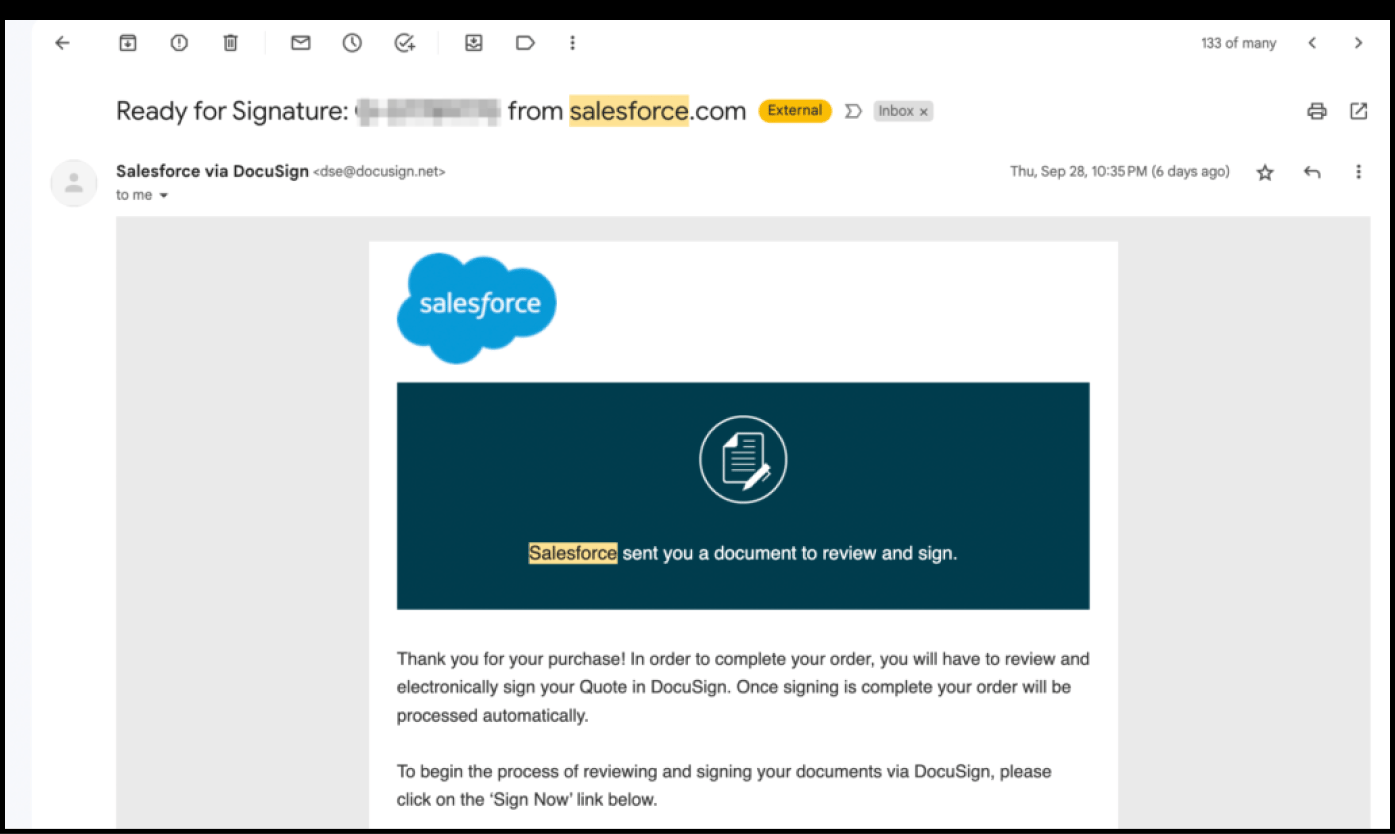
Step 2: Assign Permissions
Next, users will receive an email with a ‘Welcome to Data Cloud’ subject line. Two types of permission sets will become visible when Data Cloud is provisioned in the organization, which can take anywhere from 30 minutes to 24 hours.
- Data Cloud Admin, which gives access to Data Cloud Setup
- Data Cloud Users
Go to Salesforce Setup and search for ‘Users’ to add the permission sets to user records. On the user record, hover over the ‘Permission Set Assignments’ tab and click ‘Edit Assignments.’ Move the Data Cloud Admin permission set from the left to the right list.
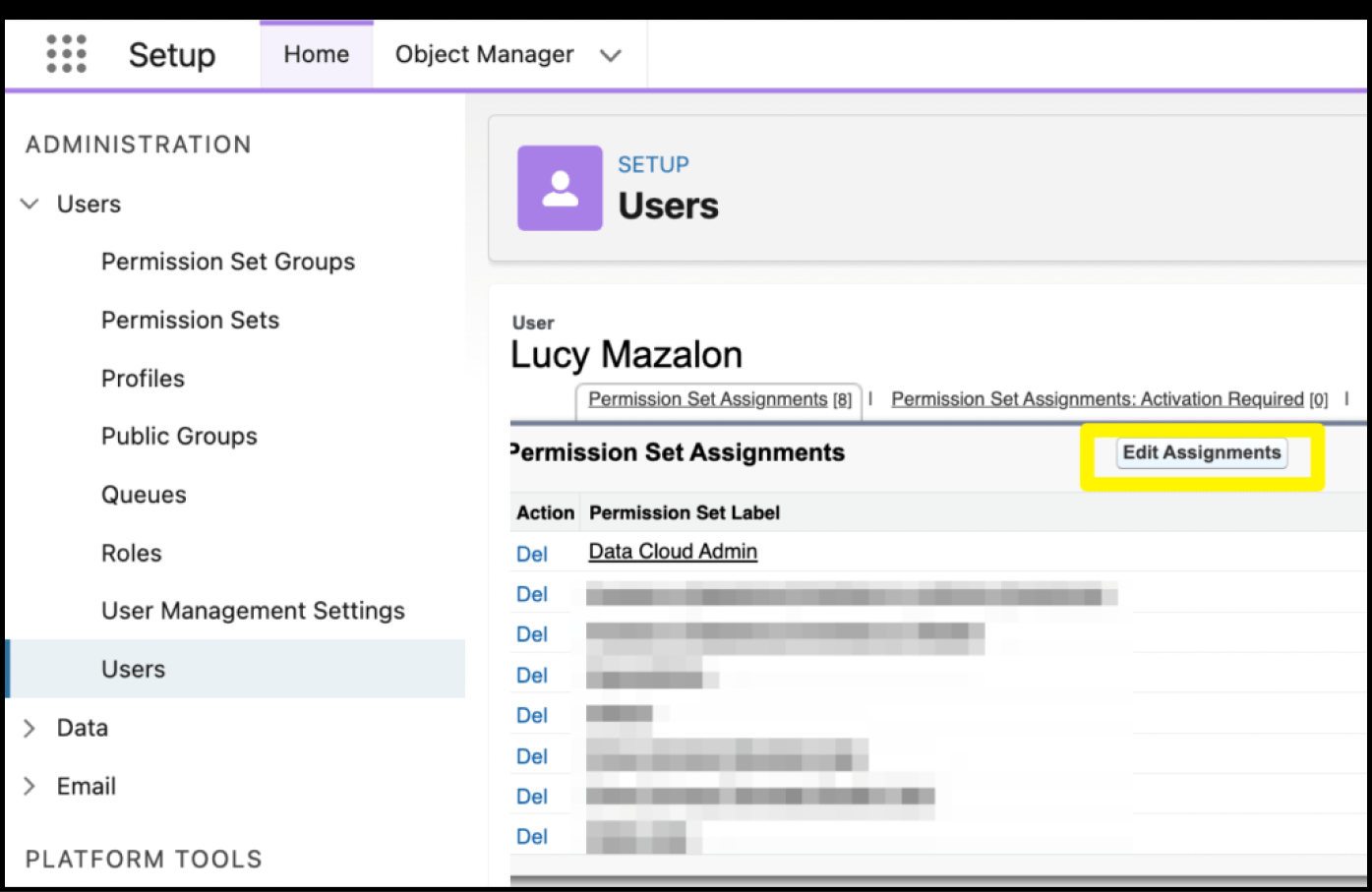
Step 3: Set Up Data Cloud
Users can see ' Data Cloud Setup ' under the ‘Salesforce Setup’ option. Click on it and land on the guided setup page.
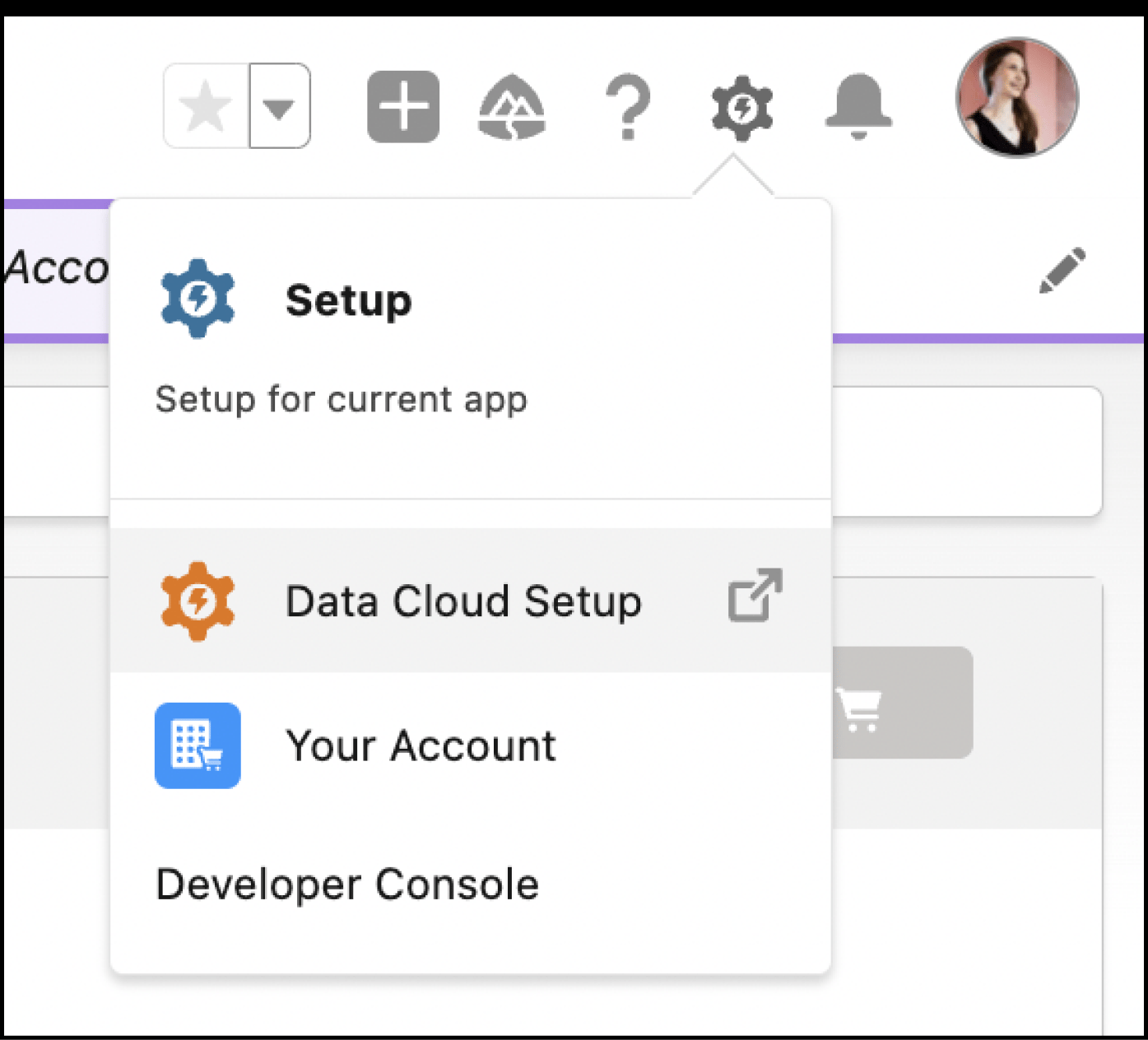
Each item will be checked off automatically when the user starts the process. The entire process will take around 15 minutes.
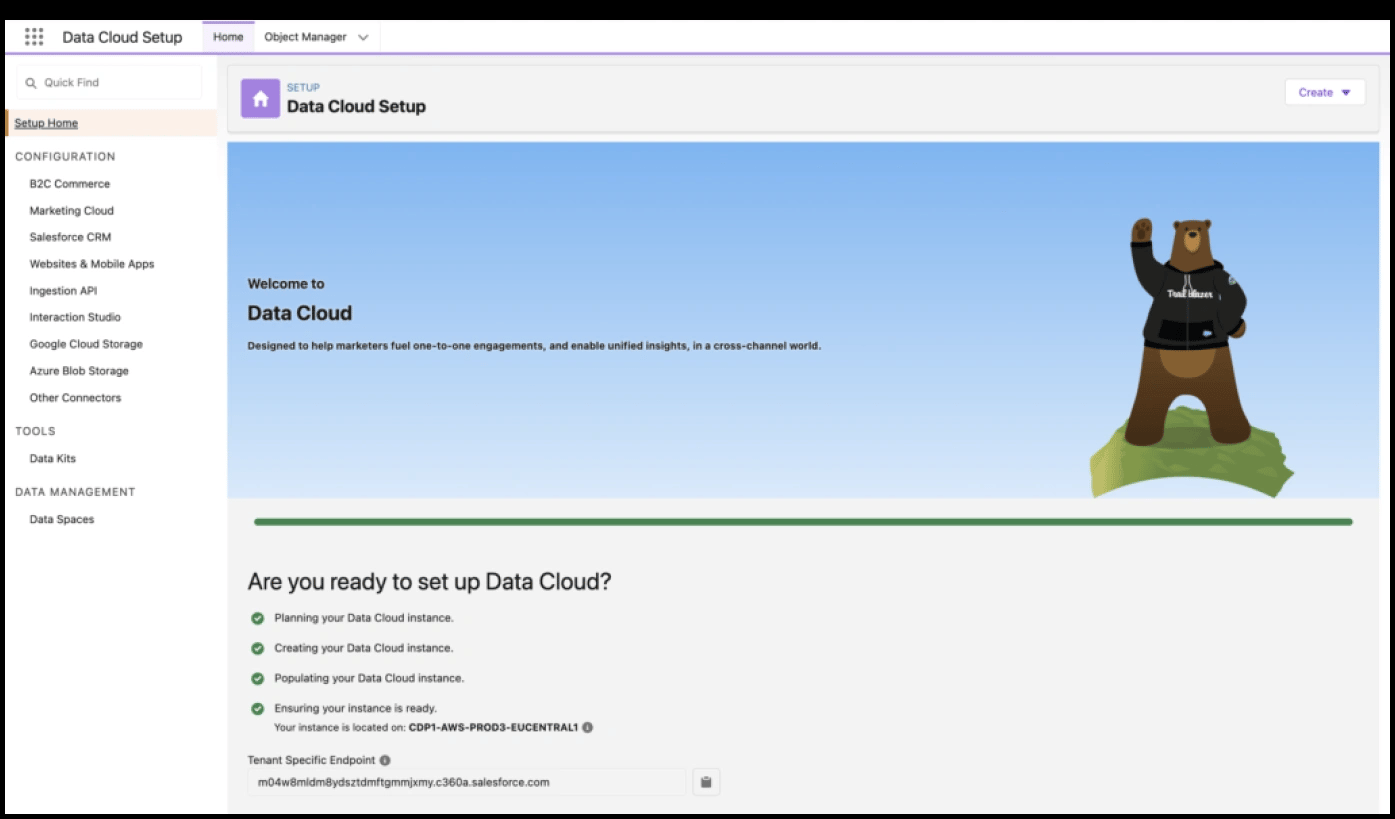
Step 4: Connect Data Sources
Next, users will be guided to a page to connect Marketing Cloud with Data Cloud. Organizations can also connect to other data sources like Salesforce CRM and B2B Commerce.
Step 5: Assign Permissions To Data Cloud Users
Go to the ‘Salesforce Setup’ option and search for users. On the user record, hover over the ‘Permission Set Assignments’ tab and click ‘Edit Assignments.’ Move the Data Cloud user permission from the list's left to the right side.
To add permissions for a few users at a time:
- Go to ‘Salesforce Setup’ and search for permission sets.
- On the ‘Permission Set’ record, click ‘Manage Assignments.’
- Move the relevant users from the left to the right side of the list.
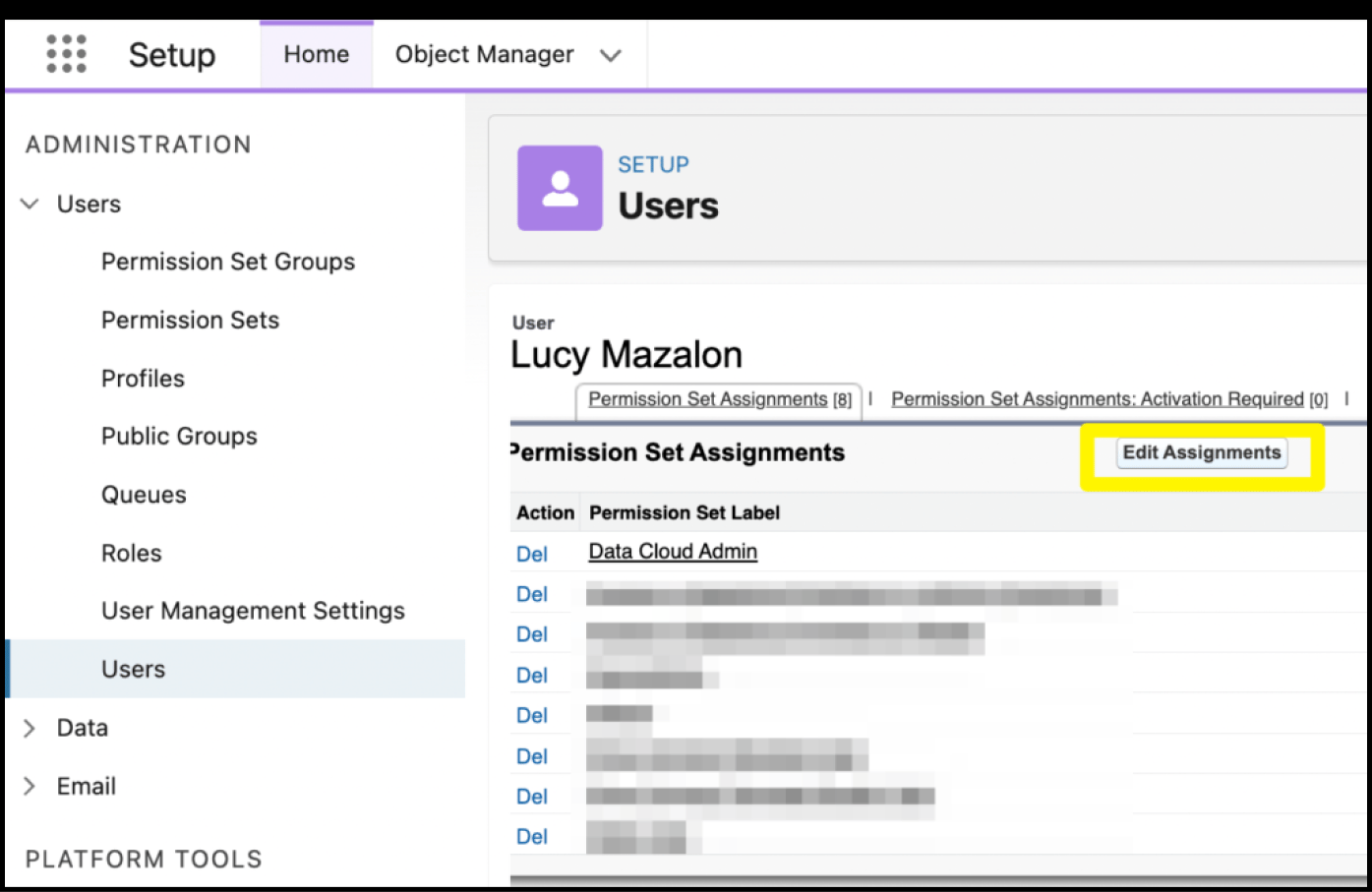
Administrators can also add permission sets to a profile to manage permissions for multiple users with the same profile. In this case, start by pulling a use report of all users with a particular profile, including the User ID field.
Export the report and change the User ID header to Assignee ID. Create another column for the Permission Set ID. Next, go to the permissions set in Salesforce and copy the ID from the URL. Paste the Permission Set ID into the correct column of the exported sheet. Use the Data Loader to do a 'PermissionSetAssignment' insert.
How Salesforce Uses Data Cloud To Fuel It’s Business
Salesforce leverages the power of Data Cloud to drive its business to new heights. By harnessing vast data sources, Salesforce gains valuable insights into customer behavior, market trends, and business intelligence.
This strategic use of data enables Salesforce to enhance its products, personalize customer experiences, and optimize operational efficiency. The Data Cloud empowers Salesforce to deliver cutting-edge solutions, improve decision-making processes, and stay at the forefront of innovation.
Through this comprehensive utilization of data, Salesforce strengthens its internal operations. And consistently offers its users a platform that evolves with the ever-changing demands of the business landscape.
The experts at Axelerant can help you create similar digital experiences by harnessing the full potential of data-driven insights. Schedule a call to learn how.

Abhishek Tripathi, DXP Consultant
Abhi likes to contribute to society, learns new skills from Trailhead, and when away from his desk, he spends quality time with his kids and helps out his wife and mother. When engaged, challenged, and appreciated at work, he’s unstoppable.

Simran Sethi, Marketing Associate
Simran is an avid reader. She is an active runner, who also likes to swim, dance, and sing. For her, the meaning of life lies in the little things. Kindness, passion, and compassion are her life’s essential values.
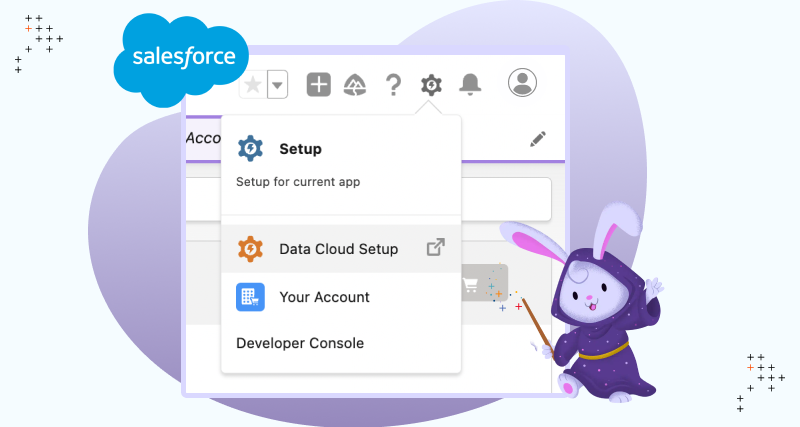
 We respect your privacy. Your information is safe.
We respect your privacy. Your information is safe.

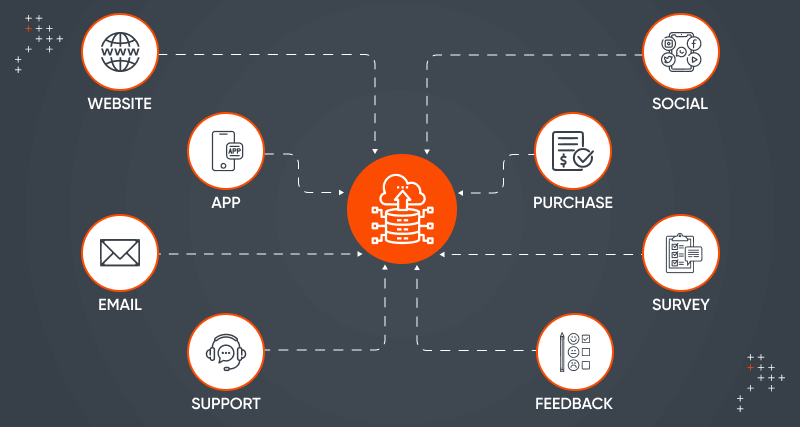

Leave us a comment